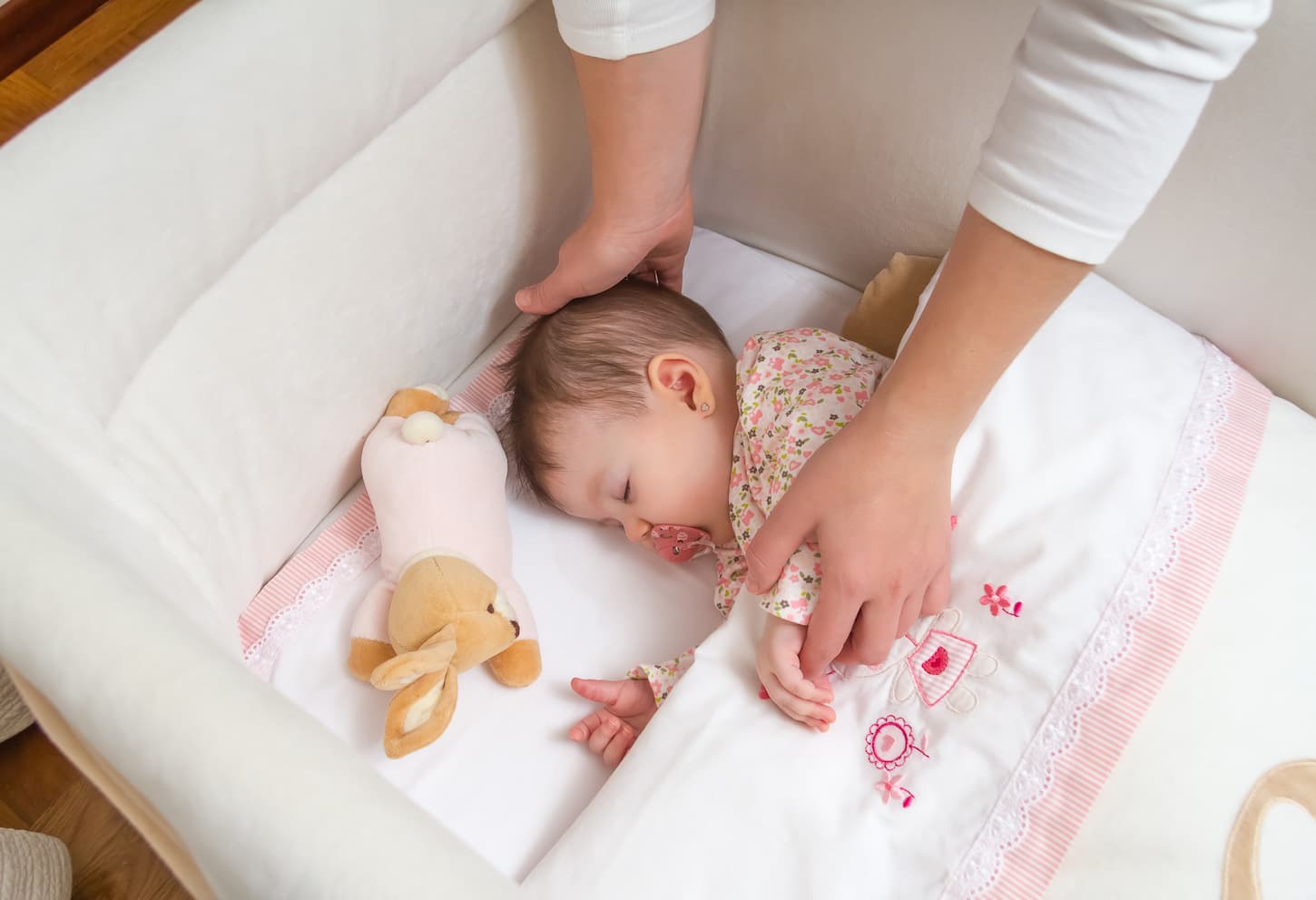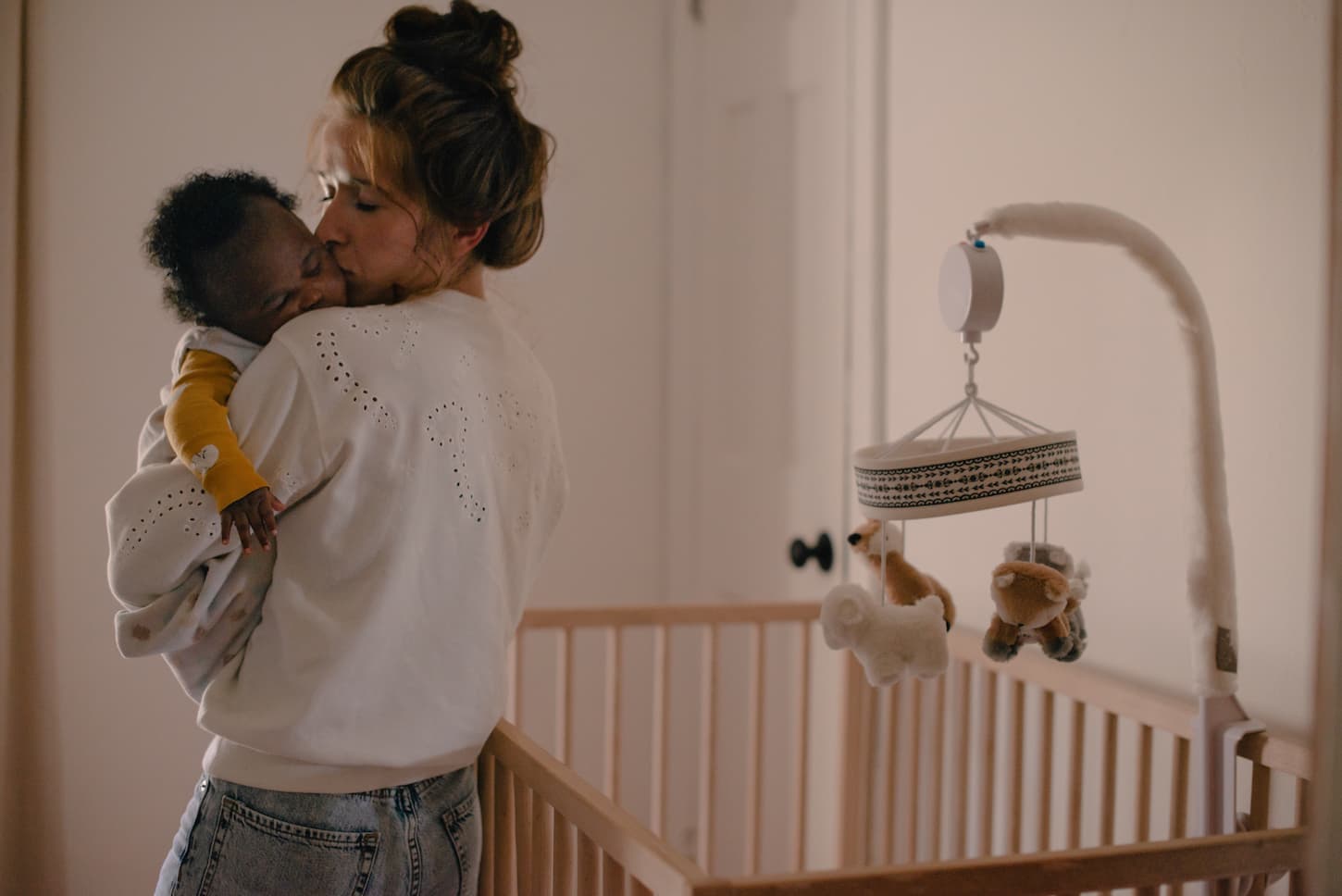Babies are learning about the world from the minute they’re born. And they have to learn quickly how to get food, care, and attention. From a few months old, babies need to start learning about bedtime too.
In general, there is no set “best” bedtime for babies – only what works for each individual baby. Listen to parental instincts and a new baby’s behavior to gauge what time bedtime should be. Remember that each baby is unique and that bedtimes will change as the child grows.
That being said, there are some trends that can be seen by looking at the bedtimes of lots of babies. So let’s look at all the things you need to consider when it comes to finding out the best bedtime for your baby.

What Time Should Baby’s Bedtime Be?
In the first year of life, babies undergo lots of major changes both physically and mentally. Their sleep requirements constantly change as they develop their circadian rhythm. The circadian rhythm is what helps to give them a sense of day and night.
So if you want to establish the best bedtime for your baby, it’s important to understand the different sleep requirements. These constantly change throughout the stages of early development.
We’ll take a close look at these individual requirements below. This way you’ll have a deeper understanding of your baby’s sleeping needs.
| Age in Months | Ideal Bedtime | Hours of Sleep Needed per 24 hours |
|---|---|---|
| 0 – 3 | N/A | 15 – 18 |
| 3 – 6 | 8 pm – 10 pm | 14 – 15 |
| 6 – 8 | 6 pm – 8.30 pm | 14 – 15 |
| 8 – 10 | 6 pm – 8 pm | 12 – 15 |
| 10 – 12 | 6 pm – 8 pm | 12 – 14 |
Newborns don’t have bedtimes – they sleep when they sleep
Newborn babies don’t have a clear concept of night and day, so there’s no such thing as a set bedtime for newborn babies. It’s not until they’re around two to three months (and often closer to four months old) that they start to get a sense of where they can differentiate between the two. This is why you can expect a newborn to wake up at any time during the night or day.
It’s normal for newborns to sleep a lot, up to 18 hours a day. And they generally won’t stay awake for more than three hours at a time. With newborns, it’s important to try and set your sleep schedule to suit theirs. Because it usually doesn’t work the other way around.
2-6 month-old infants’ bedtime: between 8-10 PM
From two to six months old, your baby will start to sleep for longer periods. This will generally be during the night as your baby’s cardiac rhythm becomes more established. At this age, it’s normal for your baby to have between one and four, half-hour naps throughout the day.
From around three months your baby will be old enough to start a sleeping routine. At three months old babies can self-soothe. So this is a good time for them to start learning about independent sleeping.
6-12 month-old babies’ bedtime: between 6-8:30 PM
From the age of 6 months, babies can start sleeping in their own room. By this time they don’t usually wake up for night feeding anymore. But they can still be disturbed at night when they’re teething.
At six to twelve months you can expect your baby to sleep for up to eight hours a night.
12-month-old babies’ bedtime: between 6-8 PM
By twelve months old, your baby should be doing most of its sleeping during the night with only one nap in the afternoon. And this nap mustn’t be too close to bedtime. It’s normal for one-year-old children to sleep for up to hours a day.
Is 6 PM Too Early For a Child’s Bedtime?
Although 6 pm might seem like a pretty early time for bed, in some cases, 6 pm can be the optimum bedtime for your baby. Especially in cases where daytime sleep wasn’t as restful or in the wintertime when the sun sets early.
Let’s refer back to the earlier table (but we’ll list the table again below because let’s make life easy) to give you a general idea of what time your baby should be going to bed.
| Age in Months | Ideal Bedtime | Hours of Sleep Needed per 24 hours |
|---|---|---|
| 0 – 3 | N/A | 15 – 18 |
| 3 – 6 | 8 pm – 10 pm | 14 – 15 |
| 6 – 8 | 6 pm – 8.30 pm | 14 – 15 |
| 8 – 10 | 6 pm – 8 pm | 12 – 15 |
| 10 – 12 | 6 pm – 8 pm | 12 – 14 |
This table is great to use as a guideline but remember, each baby is different and there will always be exceptions to the rule.
In my experience, 6 PM is a great bedtime if there have been issues with naptime during the day. That way, your baby won’t become sleep-deprived after a busy day where naps weren’t as restful as they should have been.

How Can I Tell if My Baby’s Bedtime is Too Early or Too Late?
Now you know approximately what time your baby should be going to bed, the next step is to aim to find your baby’s ideal bedtime. And to do this you must observe your baby.
If your baby seems wide awake at bedtime or is fighting to sleep for over half an hour, these are signs that your baby’s bedtime is too early. If your baby wakes up in the middle of the night, fresh and ready to start the day then this also suggests that bedtime needs to be a bit later.
If your child is overtired and irritable at bedtime then this is a sign that you’re leaving it too late. Signs of overtiredness include irritability, eye rubbing, and crying. When your baby is overtired, then it may be too wound up to fall asleep.
If your baby is fighting sleep or napping for over 2 hours in the day then these are also signs that bedtime is too late.
If you think that your baby’s bedtime is too late or too early then you should change its bedtime. But you should do this in small stages by reducing or increasing the time by just 15 minutes each night.
You must be patient because finding the correct bedtime can take a couple of weeks. And to help you establish your baby’s bedtime you should start using a bedtime routine.
What is a Bedtime Routine?
When it comes to establishing a bedtime for your baby then a bedtime routine is a must. And this can be started from around three months old. A bedtime routine is a wind-down time when you start preparing your baby for bed and sleep
The routine should be a special practice that strengthens the parental bond and helps your baby establish a healthy sleep routine. Slowly, your baby will start to learn the signs that signify that sleepy time is approaching.
This early bedtime routine helps your child to develop healthy sleep habits in later life. And these good sleeping practices are vital for development.
When it comes to creating a sleeping routine for your baby, you should start it half an hour to an hour before bed. Make your baby’s atmosphere relaxed by using dimmed lights and lullabies. A warm bath can help your baby relax followed by a baby massage and a change into fresh bedclothes.
How Can I Help my Baby Sleep Better?
Because their sleeping routine can change so much then you may often find yourself unexpectedly with an overtired baby. To help your baby become a better sleeper then here are some tips you can follow.
- Expose your baby to noise — Babies are very sensitive to noise in the early stages. But it’s good for them to get used to sleeping through noise. Don’t be scared to make noises when your baby is sleeping. Eventually, your baby will learn to sleep through them.
- Make night and day clear — Make the distinction between night and day very clear in your baby’s environment. In the daytime, let plenty of daylight in. And keep your baby stimulated with activity and noise during awake time. In the evening time, keep lights low with activities and stimulation kept to a minimum.
- Notice when your baby is sleepy — When your baby is sleepy, act on it by putting it down to rest. This way your baby won’t get overtired. Signs that your baby is sleepy include an overall calmness and gazing peacefully off into space.
- Keep the bedroom cool — According to research, babies find it easier to sleep in a cool environment. The ideal temperature for your baby to sleep in is 68 to 72 Fahrenheit.
How to Manage Your Sleep With a Baby
Babies and their sometimes erratic sleeping patterns can have a bad effect on parents’ sleep too. So here are some tips on managing your sleep with a new baby.
- The most valuable tip is to adjust your sleep pattern to fit your babies. This is especially true with newborns. To get the maximum amount of sleep, then try and rest when your baby does.
- If you’re suffering from sleep deprivation then don’t be afraid to ask for help. Get your partner more involved or ask family or friends to stay over to help you every now and then.
- And try to stay positive.
Eventually, your child will develop good sleeping patterns and your sleep deprivation won’t last forever.
Do Babies Sleep Better With an Early or Late Bedtime?
Generally speaking, babies should go to bed earlier rather than later. Babies that go to bed earlier usually have longer and deeper periods of sleep. But just like with all the other sleep advice, it ultimately depends on your baby.
It’s natural to assume that if a baby goes to bed later then they will sleep longer into the morning. But this isn’t true. A baby that goes to bed later may still wake early. This is because they’re responding to daylight and circadian rhythms rather than routine.

What Should I Do if My Baby is Having Problems Sleeping?
If you have concerns about your baby’s sleeping schedule then don’t be afraid to consult a health professional. Sleep is vital for healthy development so your baby must get enough. If your baby is having problems sleeping, this could also be a sign of an underlying condition so this is another good reason to seek professional advice.
If your baby has gotten a clean bill of health from a pediatrician, then it’s important to try changing small aspects of bedtime routines, the sleeping environment, and daytime routines until your baby sleeps better.
Pro tip: some babies just don’t sleep well. Or they don’t need as much sleep. These babies may settle into a better routine with practice as they get older. So keep doing your best.
Your baby’s bedtime is something that will change a lot in the first years of life so the important thing is to be flexible. Try not to become frustrated if your routine is shattered, it’s just a case of working with your baby to get it just right.
And remember that your baby is a beautiful and unique individual, a bedtime that works for some babies won’t necessarily work for others.
Final Thoughts on Bedtimes
In my experience, picking the right bedtime is an art more than a science (although there’s definitely a science behind it, too). But expect to start with a “late” bedtime as your newborn reaches the end of their fourth trimester.
As their brain matures to the point where they can settle into a more reliable circadian rhythm, know that bedtime will be late. What worked for us was closer to 10 PM.
Then, as they grow, you’ll be able to move bedtimes earlier – until you reach an equilibrium of what works for you, your baby, and your family. And that’s when everyone will sleep better together. So be patient – because it does take time. But it will happen – especially as you incorporate sleep training methods into your natural family bedtimes so that sleep can be a natural, easy thing for everyone.
And if you’d like free help with that process, make sure you join our free newsletter. Subscribers get access to a host of free worksheets and resources that aren’t available anywhere else.
Resources
Learning about parenting or sleep training techniques is important to learn from various reputable sources. These are the sources used in this article and our research to be more informed as parents.
- Bellefonds, Colleen de. “Getting Baby on a Sleep Schedule.” What to Expect, 4 June 2020, www.whattoexpect.com/first-year/baby-sleep-schedule.aspx.
- NHS Choices, NHS, www.nhs.uk/conditions/baby/caring-for-a-newborn/helping-your-baby-to-sleep/.